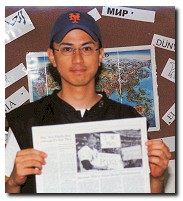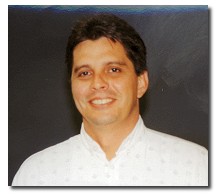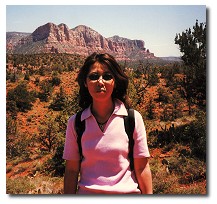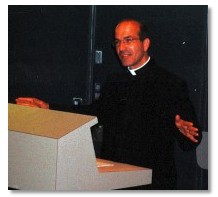ELI students:
a thousand faces, a thousand paths
While surveys and statistics may help to describe the "typical" ELI student, in truth each individual who comes to the English Language Institute brings a unique experience to its classrooms. Below are the stories of just a few who passed through the ELI halls in 2001 on the way to their future.
Mother and son
"Those frosty Russian nights keep you young."
That's the explanation Max Baldytchev liked to give ELI students who couldn't believe their classmate Irina was not Max's sister, but actually his mother. The pair, who arrived in Newark in January 2000, are in fact ELI's first mother-son duo. Max, 20, is used to the confusion his mother's youthful appearance creates. "When we used to
 |
|
Irina and Max
Baldytchev
|
vacation on the Black Sea," he says, smiling, "people thought we were honeymooners."
Max's father, Sergey, a computer programmer in the Department of Development at UD, came to the United States three years ago. The family's home on South College Avenue, which is also shared by Max's younger brother, Ivan, 16, is simply decorated, with icons and prints of Russian saints and Czar Nicholas on the living room mantle and a few old 45 rpm records -- including Michael Jackson's "We are the World" -- covering one wall.
The previously forbidden religious relics, Irina explains, are now in vogue in Russia. But while the fall of communism meant greater freedom of expression, it also spelled economic hardship for many, including Max's father, who lost his job. Irina, 42, left her position as a university physics professor in Ukhta, north of St. Petersburg, to join her husband along with her sons after Sergey joined the UD staff last year.
After four sessions at ELI, Max was admitted to UD in the fall semester as an undergraduate in the Physics Department. Irina, who has completed Level IV, plans to continue studying at ELI and look for a job in her field. Despite the difficulties of adjusting to a new language and a new culture, the pair seem content.
"Day to day life is easier," said Irina.
"Yes, it's wonderful," said Max. "Here everything works."
Best friends
Claudia Lopez always remembers her friends.
Once the 31-year-old Colombian public servant arrived in Newark and began her studies at ELI in January, she contacted her friend Diana Vivas. This would be a good place for you to study, too, she told her.
Like Lopez, Vivas, 31, wanted to pursue a master's degree in the United States.
 |
|
Diana Vivas
and Claudia Lopez
with Tommy and Ramon |
Having attended an American high school in Colombia, the industrial designer knew she just needed to brush up her composition skills. Lopez, on the other hand, required more time to improve the English that had never come easy for her, before pursuing a graduate degree in public administration.
When Vivas arrived in March, Lopez was still trying to obtain the necessary documentation for her very best friend, Ramon, to join her in Newark. The pair missed each other terribly. But getting Ramon here was complicated. The five-year-old bloodhound Lopez had raised from puppyhood needed vaccinations, dental work, a medical certificate with a color photo and a permit from the Colombian Agricultural Institute before he could enter the United States. And the airline had its own requirements: the canine couldn't travel in the hold until the weather warmed up. And he had to be accompanied by a human.
Lopez and Ramon were finally reunited in April and were joined in their Victoria Mews apartment by Vivas and Tommy, a four-month-old golden retriever Vivas adopted here. Since then their other plans have worked out as well. Lopez was accepted at Colombia University and Vivas at Pratt Institute in New York.
In order to prepare themselves for graduate study, the pair -- co-valedictorians at the June graduation -- both completed the English for Academic Purposes course, which they found demanding and rewarding.
"We were up until past midnight doing homework," Lopez said, laughing.
"That was what we wanted," added Vivas.
In the ballpark
One by one, Yuzuru Yamazaki is checking off his dreams from his "To Do"
list.
Last year the 28-year-old architect built a house for his parents in Tokyo. This year, Yamazaki is studying at ELI in pursuit of another goal. Since he was ten years old -- the summer his father took him to a Baltimore Orioles game against the Yomiuri Giants -- he's dreamed of working for an American baseball team.
Yamazaki has tried other means. At the opening game between the New York Met and the Chicago Cubs in Tokyo last year, he succeeding in meeting the Mets' manager and handed him his resume. For his efforts, he got his picture in The New
 |
|
Yuzuri Yamazaki
|
York Times, but no job. At Shea Stadium in New York, he wore a message board which proclaimed, "Please fulfill my dream. I want to work at your ballpark." That ploy helped him meet several Mets players and did get him a job offer -- from the owner of the stadium's sushi bar.
But Yamazaki has loftier goals. After leaving ELI, he plans to study advertising at an American university in order to become a press agent for the Mets. He thinks he could attract a lot more Japanese fans, like himself, to Mets games.
Yamazaki's father supports his goal.
"If you have a clear dream," his father told him, "you should try at once. It's the best way to enjoy your life."
Sleepless in Newark
Edivaldo Panini grew up fast -- maybe because he's always doing two things
at one time.
At ELI in the May-June session, for example, "Panini" as his friends call him, would arrive in his Level III Reading/Writing class, tired and bleary-eyed. In addition to homework, the 34-year-old was spending two to three hours a night on other assignments -- much of it by email -- for his job in Brazil.
 |
|
Edivaldo Panini
|
For Panini, a crop development coordinator for the DuPont Company, working and studying at the same time come as nothing new. When he was nine, he got his first job, in a sawmill close to his home in Conchal in Sao Paolo state. The oldest of four siblings, he put in five hours a day, six days a week, sawing wood. Ten out of the 30 workers at the mill were children, Panini said, and the extra cash helped pay for a watch and a bicycle.
By the time he was 12, Panini was working for his father, a harvesting contractor, driving a van and coordinating four other workers as they picked oranges, cotton, cassava and sugarcane.
After high school, he joined DuPont. From 7 am to about 6 pm he worked as a field coordinator. From 7 pm to 11 pm he studied biology at Catholic University in Campinas City. Occasionally, Panini, who married at 19 and had his first child when he was 20, would return home around midnight to find his baby sick.
"Sometimes," he said, "I didn't sleep."
When DuPont offered to send him to Newark to study English, which he uses daily on his job, Panini jumped at the chance. Though a full-time student and technically on leave, he continued to coordinate his job via email. Even if that meant -- as it had in the past -- that sometimes he didn't sleep.
Have English, will travel
Hong-ju Park knows where she wants to go. And somehow she always gets
there.
As a graduate student in sociology at Ewha Women's University in Seoul, she spent four months of vacation time in Europe. In order to manage on a student's budget, Park learned how to cut corners, at times sleeping in train stations.
 |
|
Hong-ju Park
at
the Grand Canyon |
"In Rome the police watch over the students," she said. "It's so common." On another trip to Egypt, determined to see the desert, she hopped on a bus for seven hours, found a guide with a camel and rode across the sand dunes for a day.
"It was fantastic," she said, smiling, "especially the stars at night."
Before coming to ELI this year, Park, 33, taught sociology for six years at Seoul City University. She took six months off to improve her English, she said, in order to participate in international conferences in her field. She managed to control her travel lust until spring break.
"I've always wanted to see the Grand Canyon," she said. No matter that it's 2,000 miles from Newark.
Park bought a $235 bus ticket and headed west, stopping in New Orleans and Flagstaff, Arizona on the way and spending three days at the Grand Canyon, including 14 hours hiking to the bottom and back, before returning via Santa Fe, New Mexico. That ride -- a two-and-half-day non-stop stretch filled with traffic jams, mechanical breakdowns and a "crazy bus driver who refused to drive at night" -- Park says she'd rather forget.
The delays meant she missed the first day of classes, but provided some valuable lessons. "The train is better," she said with a sigh.
A childhood prophecy
When Rodrigo Alfonso Arrazola came to ELI in March, he was following,
he says, a spiritual path.
 |
|
Father
Rodrigo Arrazola
|
That path led him to the United States in 1996, when the Colombian medical doctor visited the country for the first time. His encounter with many Spanish speaking immigrants in New York City, he says, was like the answer to a calling from God which he'd first felt when he was eight years old.
His father had just built a house near the beach and asked a priest to come bless it. After performing the ritual, the priest turned to Rodrigo.
"You will become a priest," he told the youngster.
Although Arrazola studied both theology and medicine, it wasn't until after his first trip to the United States that he decided to realize that childhood prophecy. Returning in 1998, he studied for one year at Mount Saint Mary Seminary in Emmitsburg, Maryland, then served as a deacon at St. Joseph Church in Hanover, Pennsylvania. Before his ordination as a priest in June of this year, the Harrisburg Diocese sent him to ELI to fulfill another job requirement -- improve his English.
Today Father Rodrigo serves factory and farm workers from Mexico, Guatemala and Puerto Rico at Corpus Christi Church in Chambersburg, Pennsylvania.
"When I celebrate the sacraments," he said, beaming, "I feel a special grace from God."